The Deepest Night tsd-2 Read online
Page 3
A hard rap sounded on my door. It opened before I could respond, and Gladys, the maid appointed to my room, walked in with a pitcher of fresh water.
“Oh,” she said, unenthusiastic. “You’re up, then.”
I smiled at her. She brought the pitcher to the bureau and plunked it down hard, sloshing water across the wood.
“What time is it?” I asked sweetly.
“Sorry, miss.” She dried her hands on her apron, avoiding my eyes. “Been so busy, I forgot to look at the clock.”
One of Gladys’ tasks was to ensure that I was awake before breakfast was served. So far, she’d not managed it once, and that was not an accident.
Scholarship students were never local girls. I could have tried to explain to her that it wouldn’t have mattered even if the duke hadn’t set that rule; that a slippery combination of destiny and magic had brought me here to the castle, not just dumb luck.
But Gladys was skinny and hostile and too old inside for someone who was only about twenty. I’d wager she’d lost any last faith in magic the day she’d needed money badly enough to take this job.
Should she and Chloe ever join evil forces, I might be in real trouble. Fortunately, Lady Chloe stooping to converse with a common housemaid was about as likely as Kaiser Wilhelm showing up bearing roses at our door.
“Thank you,” I said brightly to Gladys’ back as she stomped out of the room.
I tried to be nice to her. Usually. I’d hate working here, too.
What Iverson lacked in electricity, enough water closets, and proper heating, it made up for in grandeur. The chambers were all done up in burnished fixtures and sinuous furniture. The staircases were of carved marble, the rugs were plush, the paintings massive and ornate.
Our dining hall was the original great room of the castle, a space so huge that the sunbeams slanting in from the windows barely reached its center, thick slices of light that blinded you on and off as you passed through them and struck rainbows from the crystal pendants of the chandeliers. Table after table was laid out in orderly rows, one for each year of students. The teachers’ dais had been placed against the southern wall, where they could critique our manipulation of forks and knives without the light in their eyes.
I made my way to the tenth-year table—blinded, not; blinded, not—sailing past the usual giggles and gossip of the other students as though I couldn’t hear any of it. Seating was assigned, so I wasn’t stuck at the end of our table because I was the last to arrive, which I was. I was stuck there because that’s where Westcliffe had put me.
I took my chair next to Malinda Ashland’s. She lifted her nose in the air and reached for the teapot between us before I could, just barely managing not to whack me with her elbow.
Pretty, snooty Malinda. No doubt she secretly wondered if Westcliffe bore her some grudge, fixing me next to her.
The rest of the girls of my class were hardly more pleasant. Beatrice, Caroline, Lillian, Stella, Mittie. I’d describe them to you, but to be honest, all you truly need to know is that they were the pampered, drawling daughters of the empire’s so-called best families. On weekends they wore cashmere and chiffon and gemstones. They knew all the rules of lawn tennis and polo and would sooner curse out loud in front of their mothers than sip champagne from a sherry glass. I existed as a boundless source of scandal for them, and that was about all.
Except for Sophia, their leader. Ever since she’d started speaking to me, they’d backed off a bit.
A bit.
“Pass the bacon, please,” I said to Malinda, who ignored me.
I leaned past her for the platter. I didn’t bother to stop my elbow from knocking into her hand just as she was lifting her cup.
She let out a hiss, shaking the tea from her fingers. “Eleanore, really! Were you raised by wolves?”
“Worse,” snickered Lillian, on her other side. “Plebeians.”
“Wolves have better manners than certain humans I know.” I scraped the last few pieces of bacon onto my plate, then moved on to the scrambled eggs. “At least they share.”
“Only after the alpha has had his fill,” chimed in Sophia, at the far end of the table.
“Or hers,” I added pointedly, with a glance at her nearly empty plate.
She sent me a lazy smile. “True enough. But then, leading a pack of lesser minds can be such exhausting work. Still, someone’s got to be in charge.”
“Someone,” echoed Beatrice, pausing over her grapefruit. “Rather odd thing to say. They’re just wolves.”
Sophia never took her eyes from mine. “Pour me another cup, Bea, won’t you?”
“Of course!”
The hardest part of meals for me was figuring out how to eat as much as I wanted without attracting adult attention. In Blisshaven there had been no assigned seats, no snowy crisp tablecloths, no chinaware, no fine silver. There had been minders instead of professors, and they’d all carried wooden batons. Breakfast had been nonexistent, tea was nothing but day-old bread, and dinner was usually a thin fish stew or veggie soup or—only on Sundays—gristly bangers and mash. About once a year someone from the government would show up for a tour, I suppose to ensure we orphans weren’t wasting any of their enormous goodwill, and suddenly our boots would be patched and our clothes mended and there were apple slices to share, or crumpets, or even gingerbread.
Imagine going from that to this: Huge salvers of roasted meats, steaming in their juices. Seafood lapped in creamy rich sauces. Vegetables no longer dissolved into soup but sautéed or baked or boiled, so you could tell what they were. Fresh rolls, so fresh the insides were still warm when you tore into them. Butter and jam, white sugar and chilled milk. Whole apples, pears, persimmons. Bread pudding, iced cakes, sweet biscuits for dessert.
Every day. Every single day.
It isn’t sloth or even birth that pins the poor in their place. It’s hunger. Hunger kinks you up. Keeps your mind obsessed and your body cramped and shivering, and you dream of how lovely dying is going to be because no one ever goes to bed starving in heaven.
I added more eggs to my plate. Malinda rolled her eyes and gave a sniff.
“Look at her,” fake-whispered Lillian to Caroline, loud enough for all the table to hear. “Speaking of wolves! She bolts down her food as if it’s the very end of the world, doesn’t she?”
“As if she’s doomed never to dine again!” Caroline fake-whispered back, stirring sugar into her tea, clink-clink-clink.
I didn’t bother to respond. As far as my stomach was concerned, it might well have been my last meal. You never knew.
I was nearly a third of the way through when I heard the ominous, unmistakable rustling of organdy and the snap of high heels against stone.
Blast.
I slowed my chewing, swallowed, and lifted my gaze to find Mrs. Westcliffe standing beside my chair. I hoped like hell there weren’t any egg bits on my face.
“Miss Jones,” she said, pinch-lipped.
“Yes, ma’am?”
“You will join me in my office, if you please.”
“Yes, ma’am.”
I cast a longing look at my unfinished breakfast.
“Now, Miss Jones.”
“Yes, ma’am.”
I pushed back from the table. Westcliffe was already pacing away, so I don’t think she noticed the giggles that whipped up anew, my classmates with their hands pressed over their mouths, their eyes sparkling with malice, and Sophia real-whispering “Dooooooom” under her breath as I walked past her.
Chapter 3
When you find yourself really, truly in the thick of trouble, there’s one very important rule to remember: Never volunteer information. Just keep your mouth shut and let the others do the talking, and maybe they don’t really know anything much and you’ll get to walk away.
I’d learned that rule, and learned it well. But as I followed the ebony-clad figure of the headmistress out of the great room and down Iverson’s hallways, my thoughts were already babbling.
Oh, was I eating too quickly, ma’am? I beg your pardon! I’m ever so anxious not to be tardy to class!
Oh, did I use the fish knife to slice the butter? How careless of me! Of course I know the difference between a fish knife and a butter knife and a tea knife and a fruit knife!
Oh, did it seem I struck Malinda on purpose? Honestly, that was an accident! I had no idea she’d be thrusting her hand in front of me then, and in her defense, I don’t think she saw me at all, since her head was turned and she was talking with her mouth full to Caroline.…
The office of the headmistress was a place no student normally wished to go, nor—if she was mannered enough or at least clever enough—would she have reason to.
I, however, was already dismally familiar with the chamber, from the lace panel curtains patterned with pansies and pearls to the vases of lilies discreetly scattered about, freshened every three days. Even the porcelain angels framing the clock on the mantelpiece smirked at me with their same familiar smirks.
You again, eh? What a shock.
I was most especially familiar with Mrs. Westcliffe’s imposing cherrywood desk (always smelling of beeswax) and the pair of baroque leather wing chairs set at precise angles before it.
Westcliffe took her seat behind the desk. I waited until she gestured at me before sinking into mine.
They were huge wing chairs. I fancied I looked like a cornered elf whenever I was perched in one.
The headmistress stared down at me with narrowed eyes. I pressed my lips into a line and stared back until I realized I shouldn’t. Then I stared at my knees.
“How are you feeling these days, Eleanore?”
I lifted my head, wary. Whatever else I’d been expecting, it wasn’t this.
“Very well, ma’am.”
“And how is your—ah—arm?”
I’d been shot in the arm. I’d been shot in the wing, too, but she couldn’t know about that.
“Doing better, ma’am.”
“The village physician has informed me that your physical recovery appears to be properly on course.”
At least something about me was proper. “Yes, ma’am.”
“It is unfortunate about the scar, but—well! What can one do?”
One can avoid being in the path of a spray of bullets, that’s what.
Mrs. Westcliffe looked away and cleared her throat. She lifted a hand to her immaculate black coif and patted at it fretfully, and I thought, incredulous, Crikey, she’s going to do it. She’s going to boot me out of the school.
Despite what I’d said to Armand, I hadn’t really thought about not coming back next year, and sitting in that overstuffed chair right then, I realized how very much I did want to come back. That however difficult my life had been at Iverson, it was still the closest thing I’d ever had to a home. I wasn’t ready to give that up yet. I’d just thought … somehow it’d all work out. Somehow the magic would keep me here, even with Jesse gone.
The angel clock began to chime.
“I’ll be late to literature, ma’am,” I said hopefully.
“You will be excused,” she replied, curt. “In fact, you will be excused for the remainder of the day. I’ve received a cable from the Duke of Idylling’s personal physician in Bath. It seems His Grace has requested a visit from you.”
Now I was the one who had to clear her throat, because when I’d sucked in my breath I’d inhaled my spit. “Uh—from me?”
“Yes. In addition, it was specified that for sake of the duke’s continued … peace of mind, the visit is to take place at once. There are tickets already reserved for us at the train station in Bournemouth. We must leave immediately.” Westcliffe drummed her nails atop the desk, frowning. “I have struggled to maintain contact with His Grace, I admit. It seems the communication policy of his new … place of residence is rather restrictive. Still, I find the haste of this plan very nearly mysterious, especially since not even one of my letters …”
She trailed off, glanced up, and noticed I was still there. The frown deepened.
“You may cease looking so stupefied, Miss Jones. Did you imagine I’d allow you to see His Grace alone?”
No, actually, I didn’t. Because Reginald, the Duke of Idylling, was locked away in a madhouse, and what I’d imagined was that I’d never have to see him ever again.
Bugger it.
I had been on a train only once before in my life. Once that I recalled, that is. Earlier this year I had traveled third class from London to the town of Bournemouth, which had the station nearest to Iverson, and it had been cramped and stinky and slow and absolutely fantastic, because every hour that passed had put more distance between me and my life at the orphanage. I hadn’t even minded the torturously upright wooden pews they’d called seats.
But I wasn’t traveling third class now. Mrs. Westcliffe and I made our way down the station platform to the first-class compartments, and strange men touched the brims of their hats to us, and a porter took my hand to help me up the steps—which I appreciated, since my skirt hobbled me so severely I had to hitch it to my shins just to climb the first rung. Good thing Westcliffe had gone aboard first.
The first-class seats weren’t merely padded, but padded in real burgundy velveteen. More porters moved up and down the aisle, offering glasses of cold water or ale and doily-lined trays of chocolates and nuts. The handful of other passengers already seated glanced up idly at the headmistress (clearly I was only a schoolgirl, and thus insignificant) but then just continued on with whatever they were doing, chatting or reading or staring out the windows as they (probably) pondered their great gobs of money.
We found our seats. I sat back and closed my eyes, hoping Westcliffe would take it as a sign I was far too weary and delicate for conversation.
No such luck.
The train gave a hard whistle to signal our start, and everything lurched and gradually settled again.
“I do not wish for you to feel apprehension at our upcoming appointment with the duke,” Mrs. Westcliffe said over the rising whine of the wheels.
I opened my eyes. She was gazing not at me but at the wall ahead of us, walnut paneling heavily varnished and a brass plaque that read Mind the Cinders. Beyond our window, the world was slipping by, faster and faster.
“No, ma’am,” I said.
“I realize that on the last occasion you saw him, matters were … extraordinary. His rational mind had retreated beneath the unbearable grief of his eldest son’s demise.” Now she did shoot me a look, sharp and pained. “His Grace is a good man, Eleanore. One who, under ordinary circumstances, would never harm a soul.”
“Yes, ma’am.”
“Do not be afraid of him.”
“No, ma’am,” I said, looking her square in the eyes. “I’m not afraid.”
She returned her gaze to the wall. “I also wish for you to know that I have appreciated your discretion in the matter. Prudence and kindness are the hallmarks of a lady, ones we foster at Iverson with great diligence.”
“Of course,” I agreed, without even a trace of sarcasm.
England past the window glass was green and blue, smeared up close, crystalline in the distance, all trees and cloudless sky.
“A good man,” Westcliffe repeated to herself, very softly, as the train rocked along the tracks.
I couldn’t help but feel for her. She loved the duke, I knew she did. And both of us knew that him loving her back was as impossible as a slum girl turning into a duchess.
Richardson Home. That was the name of the duke’s madhouse. My own had had an equally oblique title, but names are dismal hiding places, really, and there was no getting around what either building actually was.
Richardson turned out to be a peachy-stoned, Georgian sort of prison, with a good long lawn opening up behind its iron gates and a few spindly trees peppering the grounds, but no hedges or ditches or anything but flat grass from here to there.
Again: no place to hide.
We were escort
ed inside by a burly, broken-nosed man who was obviously not a butler, although he was dressed as one. I noticed Mrs. Westcliffe delivering him a sidelong glance as he accepted our wraps, but all he did was ask our names and then disappear behind a door—also burly, composed of wide oaken planks and steel studs—leaving us standing alone like almswomen in the foyer.
“My!” said Mrs. Westcliffe, but not too loudly.
The foyer was plain stone, unfurnished and chilly; I’d bet those walls were ruddy thick. I hugged my arms over my chest, then rubbed at my cold nose. Westcliffe drew her spine straighter and stared fixedly at the oaken door.
If she was willing it to open, it worked. The man who came out now was nothing at all like the make-believe butler who’d gone in.
“Ladies,” the new man greeted us. He was short and pudgy and nervously blinking, rather like a mouse spotting a pair of cats before him at the last second. But he kept coming forward, and with his very next step the stench of rancid grease from his hair pomade nearly flattened me.
Westcliffe was shaking his hand, introducing us both. I nodded at the right moment, then eased behind the headmistress and tried to breathe shallow breaths.
This, then, was the duke’s personal physician. This fidgety, fat, smelly man.
For the first time ever, I think, I felt a thread of sympathy for His Grace.
The doctor led us through the doorway, talking all the while.
“ … that you made it here in all haste. It will please the duke mightily. He’s been adamant that he speak with you—that is, with the young lady—as soon as possible. We’ve been utterly unable to reason with him about it.”
“I see,” said Westcliffe faintly.
Richardson Home on the inside was nothing whatsoever like a real home. We were walking down a corridor lined with sulphur-glass sconces, passing no parlors, no drawing rooms, only closed doors, most inset with small, barred windows. The reek of pomade had become overwhelmed with that of bleach and morphine and sour human waste.

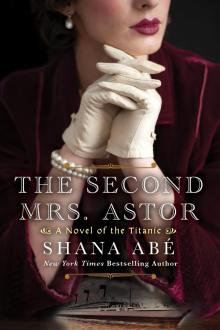 The Second Mrs. Astor
The Second Mrs. Astor The Treasure Keeper
The Treasure Keeper The Deepest Night
The Deepest Night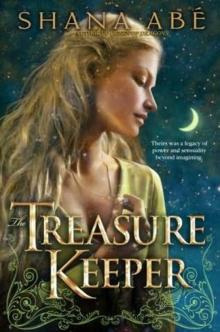 The Treasure Keeper d-4
The Treasure Keeper d-4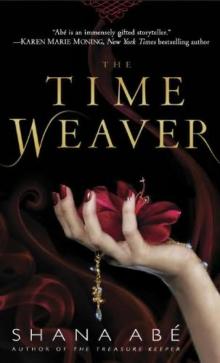 The Time Weaver d-5
The Time Weaver d-5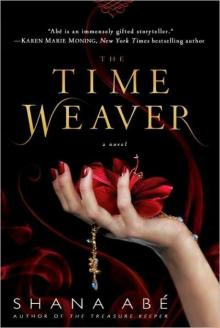 The Time Weaver
The Time Weaver The Smoke Thief
The Smoke Thief The Sweetest Dark
The Sweetest Dark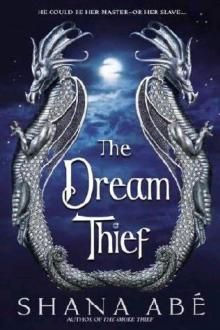 The Dream Thief
The Dream Thief The Deepest Night tsd-2
The Deepest Night tsd-2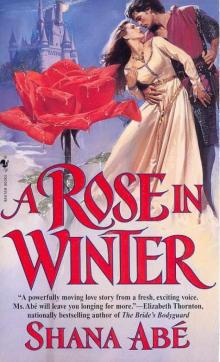 A Rose in Winter
A Rose in Winter Queen of Dragons d-3
Queen of Dragons d-3 The Smoke Thief d-1
The Smoke Thief d-1